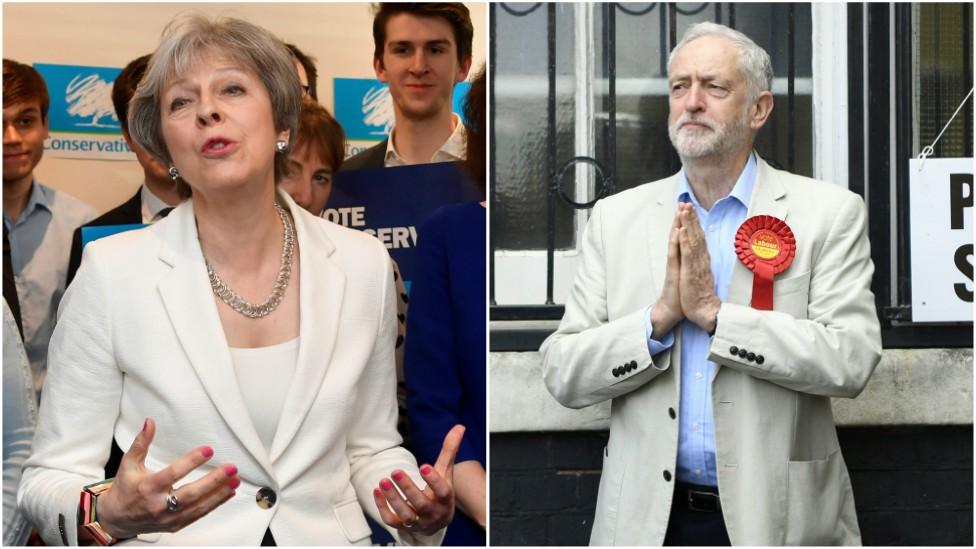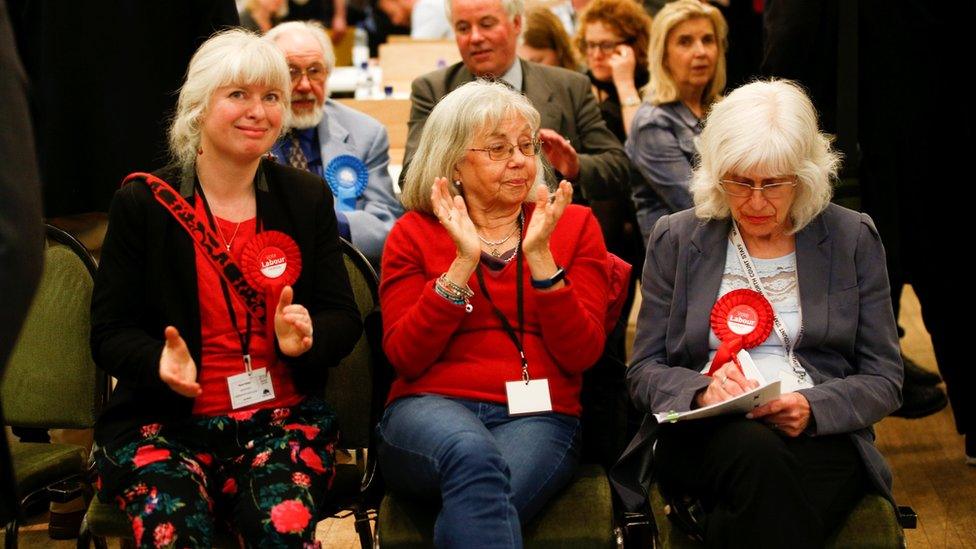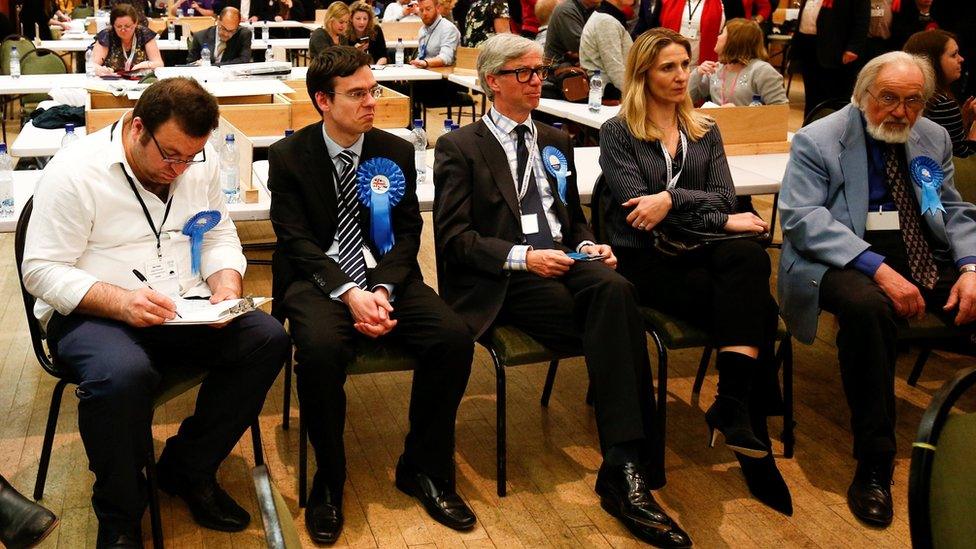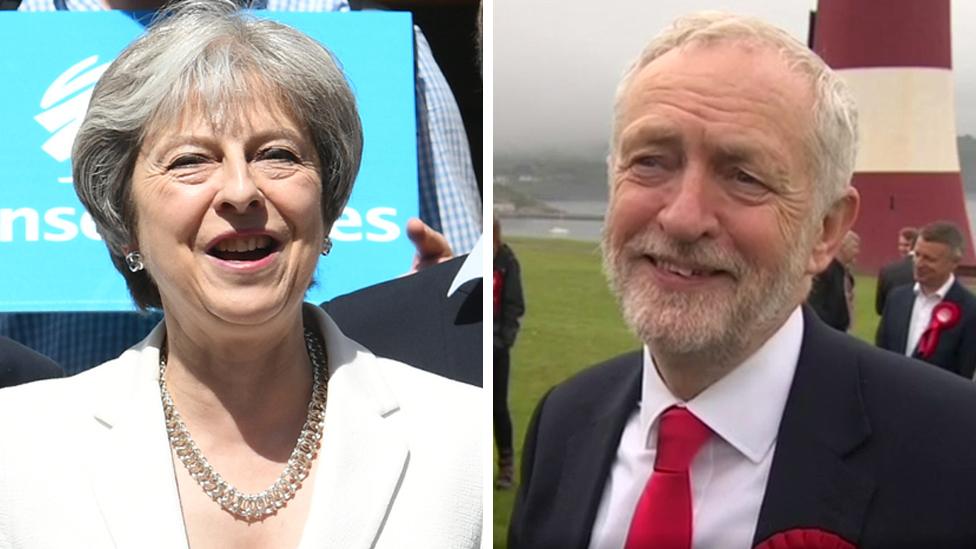Local election results 2018: Parties must break out of comfort zones
- Published

They seem stuck with each other - so close, in fact, that our projected national share of the vote from the results would mean that, in a hypothetical general election tomorrow, the two main Westminster parties would receive exactly the same levels of public support.
For reasons we've discussed at length overnight and in recent days, we have to be careful about directly transposing what happened on Thursday into a theoretical nationwide election.
But while in one sense not very much happened in the local election - not very many councils and seats changed hands and neither of the main parties have (with a couple of hours to go) made dramatic strides - something important did happen.
Voters opted again for roughly the status quo, underlining the trends that we saw developing at the general election as the political parties grappled with a new landscape after the referendum.
Labour piled up support in big urban areas, but struggled to show advances in towns or areas where there used to be big industries, which are often - inconveniently for them - the kinds of places that have Westminster constituencies that swing the election.
And notably, in part due to the grim row over anti-Semitism not being tackled in the Labour Party quickly enough, Labour did not make the kinds of additional gains in London boroughs they had suggested, even though in some of those critical parts of the metropolis, they ran the Tories extremely close.
The comfort zone problem
Almost in a mirror image, the Tories have struggled to get voters in big cities on side, even though, as above, they held back what would have been totemic losses in London.
But they nibbled away in some of those kinds of places where Labour lost some of their appeal.
Just as at the general election, we saw that outside London the Conservatives inched forward, and inside London, Labour took some small steps.
There were of course many other interesting results, and you can read about them here. However, broadly speaking, both of the main Westminster parties maintained their comfort zone, but showed little evidence of pushing out of it.
At this stage of the electoral cycle, that is a significant problem for the Labour Party.

To demonstrate to the public, and to their own foot soldiers, they are banging on the door of No 10, they were eager to show more striking advances that did not come to pass.
Some of their own MPs have been candid enough to admit that, in the last few hours, and to confront the geographical divide in their vote.
But for the Tories too, there is a sense of relief, rather than a feeling of hope.
They held off challenges more effectively than they expected to, but again, they showed little sign of having much to offer to voters in what's alien territory for them.
Just as in June last year, we saw broadly Tory v Labour, Towns v Cities, Young v Old, and Leave v Remain.

Of course it's not as simple as that. The Lib Dems had a better night than expected and UKIP pretty much disappeared.
But the fault lines which the Referendum exposed are deeper still.
And here is the conundrum for Labour and the Tories - they both are perhaps digging deeper into their holes.
Warnings within
For the Tories, in the traditional context, this can fairly be described as a pretty decent performance after eight years in government, which traditionally see parties get hammered as voters get fed up with them over the years.
It would be perfectly easy for them therefore to say, move on, nothing to see here, let's carry on as we are, not least because the Tories are divided, and have faced drama after drama.
But there's caution too. One senior Conservative warns that in London Councils they held on "in spite of the Westminster government and not because of it".
They added: "The big risk is that the national party kicks the reform can down the road because we are trundling along. Just because the wheels didn't fall off, doesn't mean the early warning lights aren't flashing faster than ever."
For Labour, the results don't suggest confident strides towards Number 10, but neither are they so bad that the party is likely to re-examine their approach.
One shadow minister told the BBC it was "very serious to be going backwards" in some Midlands areas.
Another said in frustration that there was "no strategy", but said nothing will change in their view, because "we've got 500,000 people who think this guy walks on water".
For real majorities, rather than hung politics, parties have to achieve beyond their comfort zones.
Until either of them can do that, perhaps Mr Corbyn can't truly beat Mrs May, but nor will Mrs May be able to see off Mr Corbyn.
- Published5 May 2018
